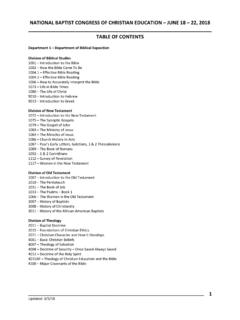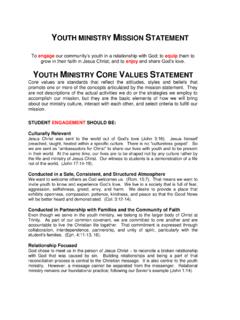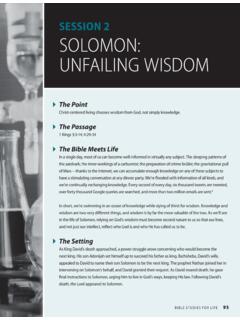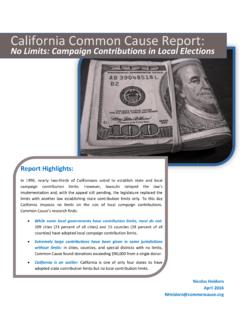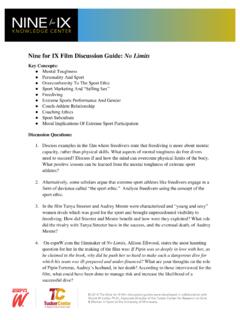Transcription of “Love Knows No Limits” (1 Corinthians 13:1-13)
1 Love Knows No limits ( 1 corinthians 13 :1-13) A Peanuts cartoon shows Lucy standing with her arms folded and a stern expression on her face. Charlie Brown pleads, Lucy, you must be more loving. This world really needs love. You have to let yourself love to make this world a better place. Lucy angrily whirls around and knocks Charlie Brown to the ground. She screams at him, Look, Blockhead, the world I love. Its people I can t stand. I m sure we all feel that way from time to time, and some of us feel that way most of the time. Maybe you feel that way right now. Loving the world in general isn t that difficult; loving the people around us can be a major challenge. In 1 corinthians 13 , we find one of the most beautiful and familiar chapters in the Bible. This chapter is typically read at weddings and anniversary celebrations. It has even been set to music. Yet, this was never the original intent. Instead, Paul was writing a rebuke to a dysfunctional church for their abuse of the spiritual gifts.
2 Typically though, this understanding is often ignored. Consequently, I wonder if most Christians have truly pondered the deeper meaning of this passage. Have we heard this Scripture so often that we no longer think about what the words mean? I would suggest that if we ignore the context of this chapter we are in danger of missing its major In 1 corinthians 13 , Paul will argue that love is an action, not an emotion. The kind of love Paul will talk about is seen, experienced, and demonstrated. This is contrary to our culture that honors personal feelings above almost everything. We do what we want when we want because we feel like it. And if we don t feel like it, we don t do it. But as I study this passage, I am struck by the complete absence of any stress on personal feelings. Hence, if love is an action, not an emotion, we need to study what God has to say about love. We need to know what love is and what it looks like when it is lived out in the In these thirteen verses, Paul provides three distinctions of love.
3 1. Love is greater than any spiritual gift (13:1-3). In these three verses, Paul mentions six spiritual gifts: tongues, prophecy, knowledge, faith, giving, and martyrdom. The first four gifts are listed in 12:8-10. The gift of giving is among those mentioned in Rom 12:8. Martyrdom does not occur anywhere else as a spiritual gift, but by its association with the other five gifts here, we can add it to the spiritual gifts God gives to His Paul kicks off 13:1 with the gift of tongues when he writes, If I speak with the tongues of men and of angels, but do not have love, I have become a noisy gong or a clanging cymbal. Some Bible students seem to have missed Paul s point here and have interpreted him as speaking merely of eloquence in human speech, but clearly he is referring to the gift of tongues. After all, the last gifts mentioned in chapter 12 are tongues and the interpretation of tongues. And those same gifts are the main topic of chapter 14.
4 It is quite logical, then, that Paul begins the intervening chapter by discussing tongues. The use of tongues that Paul is speaking of here is the gift of speaking a private prayer Paul says you can speak in tongues all you want, but if you don t have love you are merely making a lot of noise. In 13:2-3, Paul mentions five more spiritual gifts when he writes, If I have the gift of prophecy, and know all mysteries and all knowledge; and if I have all faith, so as to remove mountains, but do not have love, I am nothing. And if I give all my possessions to feed the poor, and if I surrender my body to be burned, but do not have love, it profits me nothing. Prophecy refers to the ability to declare God s truth in a powerful, life-changing way. Knowledge involves the deep understanding of the Word of God. Faith is the unique ability to trust God for great things. These three gifts are all from the Holy Spirit, and yet without love the person who has them is nothing.
5 Verse 3 poses a problem because it asks us to ponder activities that we automatically consider noble. Giving to the poor is a good thing to do. And dying for your faith in Christ is the ultimate sacrifice. But as good as these things are, without love they do you no good. Paul declares that the greatest expression of spirituality is love. We could summarize these three verses like this: Without say nothing, I am nothing, and I gain nothing. Clearly, we must have love when we are exercising our spiritual gifts. So stop for just a moment and reflect on your spiritual gifts and your ministry in the local church. Do you do what you do out of genuine love for people? Or do you serve out of a sense of obligation? Do you serve because of the satisfaction you derive from ministry? Do you minister because you like honing your skills? Although no one has perfectly pure motives, we ought to be seeking to grow in our love quotient.
6 Paul says that love is an action, not an emotion; therefore, we need to put feet to our love. [After talking about the importance of love, Paul now will discuss how love behaves.] 2. Love is expressed by supernatural responses (13:4-7). Love is a word that can only be properly defined in terms of action, attitude, and behavior. Paul has no room for abstract, theoretical definitions; instead, he wants us to know what love looks like when we see it. Thus, he paints fifteen separate portraits of love. Yes, that s right: in the space of four short verses Paul uses fifteen verbs, all of which have love as their subject. Our contemporary definition of love is that it is an emotion or a feeling we love our jobs, we love football, we love pizza. In the biblical definition of agape, love acts, for love is an action, not an Verse 4 begins by summarizing the unselfish nature of love. 1) Love is patient.
7 The Greek language has several words for patience. One signifies patience with circumstances while another is used only in reference to patience with The Lord Knows we need both kinds of patience, but it is this second word that is found here. The KJV renders this word long-suffering. I like this! Paul seems to be saying that love doesn t have a short fuse. It doesn t lose its temper easily. A person who exercises agape love does not lose patience with people. Love never says, I ll give you just one more chance. Love is patient. The longer that I am in pastoral ministry, the easier it is for me to be patient with others. With every passing year, I recognize more fully that I sin against God and others. As God humbles me with my own sinful shortcomings, I find it easier to exercise greater patience with others. Loving people are willing to tolerate the shortcomings of others because they know they have faults too.
8 As you mature do you feel more and more patient or do you feel you are growing more crotchety? God wants you and me to grow in patient love for those whom we minister to and with. 2) Love is Patience must be accompanied by a positive reaction of goodness toward the other person. Kindness, however, is not to be equated with giving everyone what he or she wants. Sometimes love must be tough. In the context of the church, kindness may mean forcing an addict to go through the hell of withdrawal. Kindness may mean saying no to a spoiled child. Kindness may mean reporting a crime committed by a friend. Kindness means to withhold what harms, as well as give what heals. Love is kind, but often Paul followed the two positive expressions of love with eight verbs that indicate how it does not 3) Love is not Jealousy implies being displeased with the success of others. Yet, true love desires the success of others.
9 The best way to cure envy is to pray sincerely for the one of whom you are jealous. To pray for him or her is to demonstrate love, and jealousy and love cannot exist in the same heart. 4) Love does not brag. The root word for brag in Greek is very picturesque and is closest to our English word, wind-bag. 11 Love is not an egotistical blowhard. Love is not big-headed but big-hearted. This means the more loving you become, the less boasting you need to do. The greater your spiritual gifts, the less prone you should be to brag. After all, the gifts you have been graciously given are from God. When you and I brag, we are demonstrating our insecurity and spiritual immaturity. Paul states that bragging is the converse of biblical love. Hence, we should pursue Christ so that we will be humble before Him and others. 5) Love is not The term arrogant refers to a grasping for power. It is more serious than bragging, which is only grasping for praise.
10 Arrogant people push themselves into leadership, using people as stepping-stones, and always consider themselves exempt from the requirements on mere mortals. Arrogance disrespects others and carries a distain for others. God calls us to serve others and be gracious toward them. 6) Love does not act This word is best translated rude. There are some Christians who seem to take delight in being blunt, justifying it on the grounds of honesty. They will say, I m just telling it like it is. But love doesn t always tell it like it is; it doesn t always verbalize all its thoughts, particularly if those thoughts don t build others up. There is a graciousness in love which never forgets that courtesy, tact, and politeness are lovely things. 7) Love does not seek its own. Love is the very antithesis of insisting upon one s own rights. Needless to say, this is a rare quality today. Ours is a society in which self-seeking is not only tolerated, it is even advocated.
